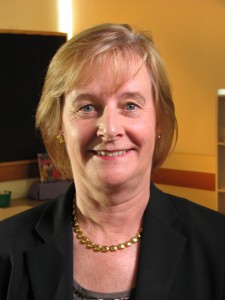 Marjorie Colvill
Marjorie Colvill
Marjorie Colvill has a clear idea of the perfect science class. It is one in which students set up their own investigations and make their own discoveries – and she has the proof that it works. From kindergarten and primary, to student teachers – she has taught them all. Not only that, Marj is now looking forward to building on her initial research, which indicates that good primary science teaching also enhances literacy!
With nearly 30 years devoted to education and science, the Tasmanian teacher has spread her passion for science from the classrooms of the state’s primary schools to the lecture halls of its university, at the same time finding time to hold a range of positions within the state’s Department of Education.
A passionate and outstanding science educator, Marj has headed both the state and national science teachers’ associations and hopes next year – at almost 60 – to complete her doctorate of science education.
For inspirational primary school teaching and for her commitment to the development of science teaching at all levels, Marjorie Colvill is awarded the 2006 Prime Minister’s Prize for Excellence in Science Teaching in Primary Schools.
Marj first experienced practical science on her family’s outback farm. Science was not a distance education subject, but her mother was a teacher and ensured that she didn’t miss out.
Despite a science teacher later in her life telling her “the only way you’ll get to a science lab is in a specimen bottle”, Marj worked as a laboratory technician at the Australian National University and renewed her fascination with science and its role in “shaping our understanding of the world”.
After a posting to Papua New Guinea in the early 1970s gave Marj a taste of kindergarten teaching, she was inspired to acquire formal qualifications. She quickly realised the role science can play in every classroom, even in kindergarten. Her practical skills in curriculum development were noticed and she jumped into a role as a science curriculum officer for north Tasmania.
Her classroom career has spanned the primary years, with her current role involving the teaching of science from Prep to Grade 6 at Perth Primary School, near Launceston. Marj’s teaching focus is on encouraging investigation – observations about tadpoles, determining if people with big feet run faster, exploring the melting properties of ice-blocks, or using dead bees to pollinate plants.
“When a little person looks at you and the light bulb of understanding comes on, it’s the best buzz,” says Marj. “And I get the same buzz when I see the same moment of realisation in young teachers – when they realise that science needn’t be scary.”
Marj sees teacher education as one of the big challenges for science in primary schools. “Many primary teachers are scared of science, they didn’t enjoy it at school, and they avoid it in training,” she says. “I had to convince our future primary schools teachers that science is important and that they could do it.”
For the past 20 years, Marj has been an active member of the Science Teachers’ Association of Tasmania (STAT), serving as its president for four years. At the national level, she has been involved, for the past 14 years, with the Australian Science Teachers’ Association (ASTA), the peak body for science education in Australia, serving as its president and editing its primary science journal for four years.
As well as teaching, Marj is completing a Doctorate in Education where she hopes to scale up her study of quality science teaching and its ability to enhance children’s literacy skills.
“I want our kids, when they leave school, to be informed so they can ask the right questions. So when we have a major debate, on perhaps the use of stem cells or GM foods, they can ask the right questions and not be victims of someone else’s agenda.”
Autobiographical details
2005-06 Advanced Skills Teacher, Perth Primary School
2003-04 Lecturer in science education at the University of Tasmania, Launceston
2001-02 District Literacy Officer, Esk District
2000 Acting Assistant Principal, Norwood Primary
1997- Doctorate of Science Education, Curtin University of Technology
1994-99 Cressy DHS
1992-93 Glen Dhu/Westbury primary schools
1988 Master of Education, Tasmanian State Institute of Technology
1987-91 Science Curriculum Officer, Northern Region, Tasmania
1978 Bachelor of Education (biology major), Tasmanian State Institute of Technology
1978-87 Primary school teacher at Summerdale Primary, Evendale Primary and Exeter Primary, Northern Tasmania
1977 Diploma of Teaching, Tasmanian College of Advanced Education
1970-73 Papua New Guinea, including work as a teacher
1969 Diploma of Medical Laboratory Science, Canberra
1967-69 Laboratory technician, ANU and CSIRO, Canberra
1947 Born Mudgee, New South Wales
Career Highlights
2006 Life Membership, Science Teachers’ Association of Tasmania
2004 Life Membership, Australian Science Teachers’ Association
2004 Teaching Merit Award (nominated by students)
1995-2002 ASTA Distinguished Service
1992 STAT Distinguished Service
1992 CRA Fellowship to Washington DC, USA
Significant achievements
President of the Australian Science Teachers’ Association (ASTA): 2000-2002.
Four terms as President of Science Teachers’ Association of Tasmania (STAT).
Edited ASTA’s primary publication, Investigating, for four years.
Edited state newsletter, Static, for three years.
In 1997, was one of two primary school teachers to be members of the Australian Science Technology and Engineering Council (ASTEC) which investigated the state of primary science and technology education in Australia. The findings were reported to the Prime Minister’s Science Engineering and Technology Council and resulted in the study that led to the influential report entitled The Status and Quality of Teaching and Learning of Science in Australian Schools.
In 2006, trained as a facilitator for the Australian Academy of Science’s Primary Connections Science and Literacy professional development programme for primary teachers.
